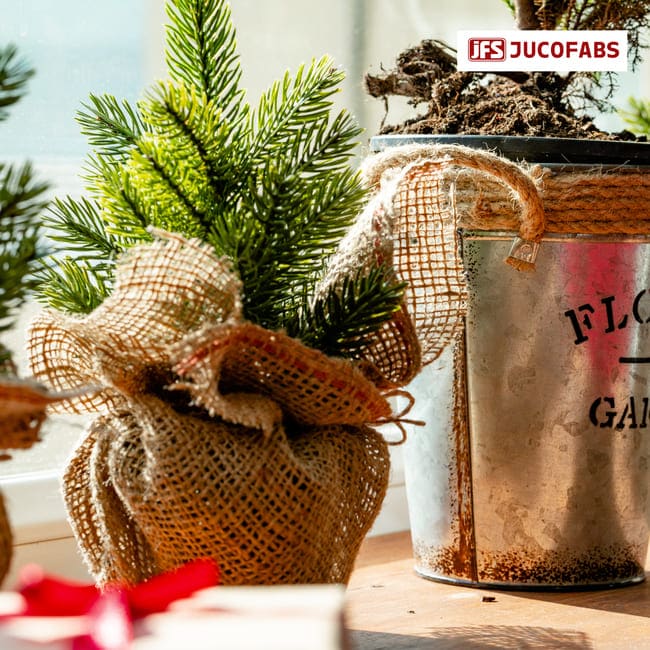Introduction
Is jute the most popular and versatile fibre at present? It certainly is. Some call it ‘golden fibre’, as this natural fibre is eco-friendly, durable, and cheap. Its properties make it suited for modern near-eco products ranging from bags to house designs. Jute's popularity reflects a shift towards more environmentally friendly options. As we learn more about its unique characteristics, it's clear why jute has emerged as the leader in sustainable, everyday things.
What is jute? Origins and unique characteristics
Jute is like a golden thread from nature's bosom, derived from the tough stalks of tropical plants. It is strong, biodegradable, and adds a rustic charm to everything it touches. The species is primarily grown in India, Bangladesh, and Southeast Asia. Jute thrives in warm, damp conditions, usually in saturated soil. The cultivation technique is simple and non-destructive:
- It matures in 4-6 months.
- It needs significantly less water than other crops, such as cotton.
- No insecticides are necessary. Jute is pest-resistant, which makes it a non-toxic crop.
› Why is jute called "The Golden Fibre"?
Jute has a beautiful golden colour during harvest season, in addition to its remarkable qualities:
- Shine and Strength: Its natural shine provides a smooth, beautiful appearance while remaining powerful.
- Eco-Friendly and Renewable: As a result of its biodegradable nature, jute is one of the most eco-friendly and renewable resources used in industries and it has positive effects on the environment.
- Versatile and Strong: Due to its durability and variety of uses, jute is reputed as the best material for green durable goods like bags, carpets, etc.
Jute's inherent properties make it ideal for anyone looking to live more sustainably while still enjoying its beauty and functionality!
How Does Jute Help the Planet?
Jute is more than just a green material; it is a superpower regarding environmental protection. This is why it excels:
› Minimal water and pesticide usage
Jute is a far more environmentally friendly crop than cotton.
- Water conservant: Jute grows with very little water.
- No dangerous pesticides: Unlike cotton, this crop does not require huge amounts of chemical pesticides during production, lowering harmful activities in the soil and water, respectively.
› Jute's carbon-fixing powers
Did you know that jute is a natural carbon sink? Here’s how it helps:
- Absorb CO2: Carbon dioxide is absorbed as the jute grows significantly.
- Produces fewer emissions: Carbon fixation lowers greenhouse gas emissions, which is vital in the fight against climate change.
So, whether it's conserving water or reducing greenhouse gas emissions, jute demonstrates that sustainability and style coexist.
Jute vs. The Rest: Who’s the Real Eco-Champion?
Jute
Vs
› Jute vs. Cotton, Polyester, and Bamboo
Jute has quickly taken the spotlight as an eco-friendly material, and for good reason. Let's see how it compares to other common fibres:
- Water Usage: Jute grows in rainy regions and requires minimal extra water. Cotton, on the other hand, is a water guzzler.
- Biodegradability: Jute is fully biodegradable and breaks down within months. Polyester takes decades to break down.
- Carbon Footprint: Jute absorbs CO₂ at very high rates, reducing its carbon footprint much lower than that of bamboo and polyester, making it a low-impact choice.
› Why Jute is the Better Eco-Friendly Choice
Jute's natural strength, durability, and fast growth cycle make it a superstar in industries that like greener alternatives—from clothing to interior decorations. Besides this, it is cheap and easy to source. You will choose quality and offer much for the planet's sustainability with jute.
Jute is a refreshing choice for a lifestyle set against a stylishly ecoconscious existence. Going green has never looked better.
Welcome to JUCOFABS, a leading manufacturer and exporter of Jute and Cotton Products. The state of art facility manufactures a wide range of Jute rolls,
Jute’s Comeback: Top Uses Across Industries
Jute is fast becoming the most popular eco-friendly alternative in almost all industries. Here's a look at why it's fast becoming the favourite sustainable material for fashion, agriculture, automotive, and construction.
› Textile and Fashion
Jute is changing the face of fashion with its natural, biodegradable properties, making it trendy yet friendly to the environment alternatives:
- Bags: From fashionable tote bags to grocery bags, fashion-forward and eco-friendly with jute.
- Accessories: Handcrafted jewellery, belts, and even sandals by jute look so rustic and full of nature.
- Home Decor: Ideal to set a cosy, earthy feel with jute rugs, cushions, and hangings on the wall.
› Packaging and Agriculture
The best thing about jute is that it completely replaces plastic, thus winning for the environment. It's versatile and supports sustainable agriculture too.
- Packaging: Jute bags are durable, reusable, and ideal for carrying groceries or bulk items.
- Soil Erosion Control: It holds soil, thus preventing soil erosion and subsequently saving crops.
- Natural Organic Manure: Jute fibres are biodegradable. Debris of jute fibres can be used as organic natural manures.
› Automobile and Building
Jute has other applications than the conventional ones, making it quite worthwhile:
- Automobile Interiors: Jute composite material can be employed for sound absorption and upholstery purposes for friendly and eco-friendly automobile designs.
- Building Materials: Jute fibres provide better thermal insulation properties and may be used to make lightweight, environmentally friendly building materials.
Being an eco-friendly product, jute is a real game changer in each industry.
Jute’s Power: Boosting Communities and Green Economies
› Jute: A Lifeline for Local Communities
Jute is one of the biggest employment sources for millions, especially in a country like India and Bangladesh. Being a highly versatile fibre, jute has provided a stable source of income for small farmers and craftsmen, which then goes on to feed their families and local communities.
- Millions Depend on It: From cultivation to weaving, jute creates jobs that keep whole villages alive.
- Empowerment of Women: Many women in rural areas earn their livelihoods through the production of jute products, thereby achieving financial independence.
› Improving Rural Economies and Eco-Friendly
- Jute is more than a crop: it can be a green alternative that encourages sustainable production and an eco-friendly lifestyle.
- Small Farmers' Income Generation: A significantly increasing demand for jute supports income generation for small farmers.
- Eco-Friendly: Jute production, after all, is eco-friendly. It consumes less water as well as chemicals, thus encouraging farmers to opt for sustainable production.
Jute is undoubtedly a hero for both people and the planet and is worth celebrating as a fibre!
The Future of Jute: Innovations and Sustainable Research
As we move toward a greener future, jute is emerging as a catalyst for innovation. Here are some fascinating aspects of jute's development:
› Cutting-edge jute fibre processing
- Advanced bioplastics: Researchers are now looking into means of converting jute into bioplastics, thereby reducing the destructive power of harmful plastics.
- Eco-friendly goods: As a result, eco-friendly packaging, utensils, and bags are all coming to be made from jute! Innovative processing technologies are expanding the scope of jute for compostable products.
› Sustainable Living with Jute
- Home Goods Eco-Friendly: From reusable grocery bags to fashionable decorative items, jute has now become part of every sustainable home.
- Industrial Side: The fashion and packaging industries increasingly opt for jute as it has the minimum effect on the environment and is in line with the needs of the conscious buyer.
Because of its inherent eco-friendliness and applications in today's world, perhaps jute is the most contemporary natural fibre that exists to herald an eco-friendly world—one product at a time.
A World of Possibilities with Jute
Jute is a far cry from just a trend, for it is taking a step into the eco-friendly difference that makes sense. Choosing jute means advocating sustainability as it checks our plastic dependency. For all those who seriously advocate for a clean earth, here's a practical, stylish, and conscious solution in jute. Integrating jute into our everyday lives will be an easy but effective step towards permanent change as we head towards a greener future.

